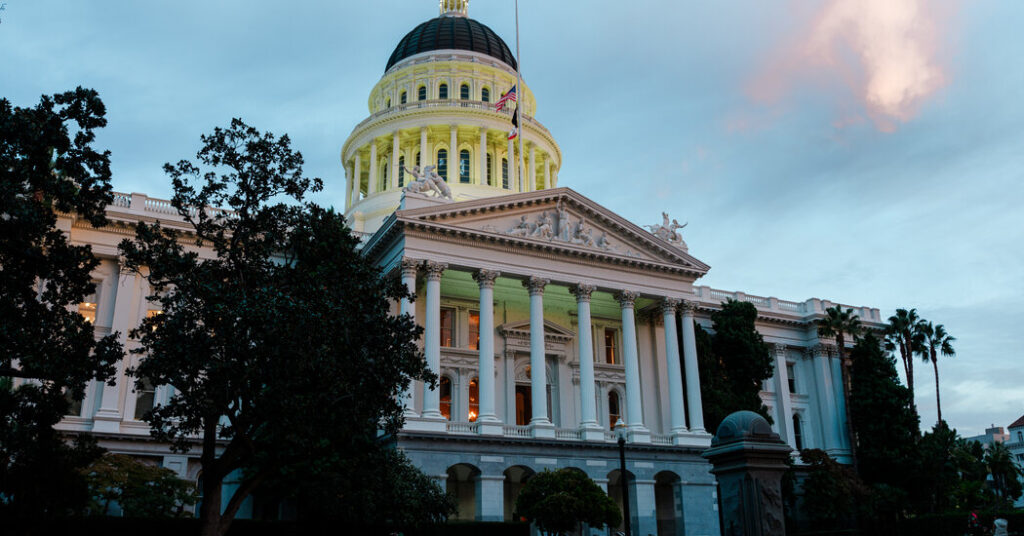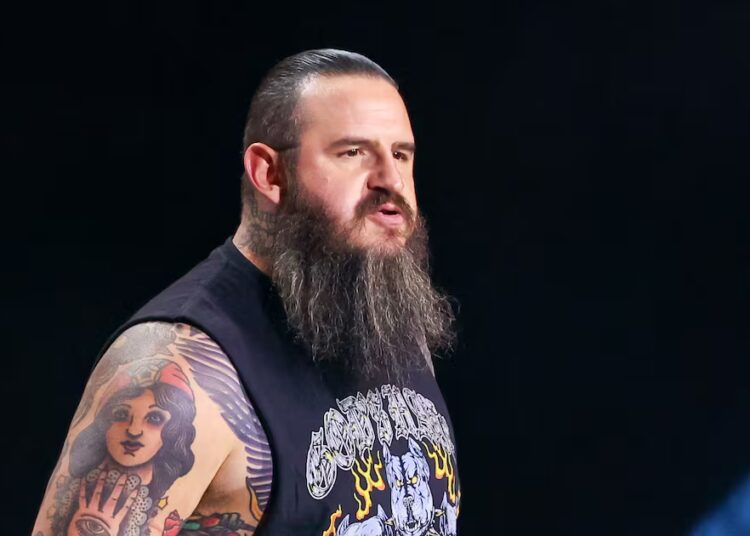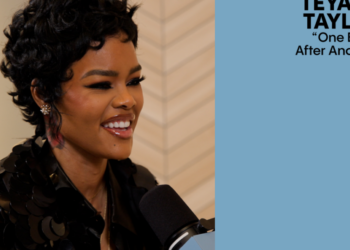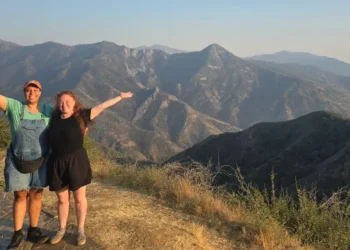California lobbyists soaked in the sun at a Maui resort last week, attending conference sessions about energy and manufacturing in the morning, and relaxing on the beach in the afternoon. For them, it was an annual escape after spending much of the year trying to muscle laws through the state legislature in Sacramento.
But in between policy discussions, the tropical luxury was occasionally interrupted by the question on everyone’s mind:
Did you get one?
Letters from the F.B.I. landed this month in the mailboxes of California’s political class, notifying recipients that their phone calls and text messages were captured on a wiretap last year. The unwelcome correspondence began to arrive almost immediately after Gov. Gavin Newsom’s former chief of staff was indicted on 23 felony charges.
The corruption case — and the F.B.I. letters that followed — has sent shivers through Sacramento’s close-knit community of lobbyists, government aides and elected officials.
Many have worked together for decades in a several-block radius around the majestic State Capitol building, drinking at the same watering holes, dining on clients’ tabs and trading political war stories. Depending on the year, they can be fierce enemies or close allies. They have gone in and out of public service, shaping policy in the nation’s most populous state.
Now, just before the holidays, they wonder how far the federal indictment may ripple.
“People are on edge,” said Rob Stutzman, a longtime Republican strategist who did not receive a letter and was not involved in the case. “There’s a lot of wondering if this is all there is to it.”
Federal prosecutors say the investigation is ongoing. A handful of Mr. Newsom’s current and former aides received the letters, the governor’s office confirmed. Numerous lobbyists also were on the F.B.I.’s mailing list. Two Maui conference participants said the emerging scandal had some attendees trying to decipher why they had or had not received a letter.
The F.B.I. is required by law to inform individuals after they have been surveilled, and letter recipients are not necessarily targets of the investigation. Still, the correspondence has sent political operatives scrolling through old text messages to remind themselves of their chatter between May 2024 and July 2024, the period that communications were intercepted, according to the letters.
The arrest and indictment of Dana Williamson, the governor’s former chief of staff, sent shock waves through Sacramento in particular. Though no elected officials have been charged, Ms. Williamson, a Democrat, has been one of the state’s top power brokers for years, having run the offices of Mr. Newsom and former Gov. Jerry Brown.
Most of the charges against her stem from what prosecutors described as a complex scheme to skim money from the campaign account of Xavier Becerra, a former Biden administration official and Democratic congressman now running for California governor. Federal prosecutors say that Ms. Williamson conspired to direct $225,000 from a dormant political account to Mr. Becerra’s right-hand man.
Two of Ms. Williamson’s associates also have been charged, albeit with only one or two crimes after agreeing to plea deals — the aide to Mr. Becerra who received the funds, Sean McCluskie, and a Sacramento lobbyist, Greg Campbell.
But because of whom Ms. Williamson and Mr. McCluskie worked for, insiders have been discussing if the unfolding case could now affect Mr. Becerra’s bid for governor — or even Mr. Newsom’s expected run for president in 2028.
The governor is not named in the case or accused of any crimes. Mr. Newsom placed Ms. Williamson on leave in November 2024 as soon as she informed the office that she was under federal investigation, and she left his staff a month later. Mr. Newsom said in a statement that he was not privy to the details as the case unfolded.
“This is not the kind of thing I’m used to seeing in public service,” he said.
“I hold our team to very high standards of ethics and accountability,” he added, “and I’m still processing the seriousness of the allegations.”
The closest the case has come to touching Mr. Newsom’s office is a charge accusing Ms. Williamson of lying to F.B.I. agents about her role in influencing litigation involving an unnamed corporation.
The details in the charge align with a sex-discrimination lawsuit that California regulators filed in 2021 against the video game maker Activision Blizzard. The company was a client of Ms. Williamson’s consulting business before she joined the governor’s office and was also represented by Mr. Campbell’s lobbying firm.
Activision Blizzard was accused of fostering a “‘frat boy’ workplace culture” rife with harassment. The state’s top civil rights lawyers believed they had a strong case and pushed the litigation forward. But in early 2022, the chief counsel was replaced, and her deputy resigned soon after, accusing Mr. Newsom’s office of interfering with their work.
The federal indictment says that in January 2023, shortly after joining Mr. Newsom’s office, Ms. Williamson “told a high level government attorney to move the litigation to a different part of state government and get it settled.” The state settled the case in late 2023.
Ms. Williamson’s defense lawyer, McGregor Scott, a former U.S. attorney based in Sacramento, said Ms. Williamson was later approached by federal agents and asked if she could help them investigate Mr. Newsom. She told them she had never seen him engage in any kind of misconduct, Mr. Scott said.
The case might also have entered Mr. Newsom’s sphere by accusing a political consortium called the Collaborative of helping to funnel Mr. Becerra’s campaign money at the direction of Ms. Williamson and Mr. Campbell. The group of top-flight California political consultants included Bearstar Strategies, a firm that has staked its reputation on managing campaigns for Mr. Newsom and other prominent Democrats.
Bearstar last week dismissed the Collaborative as an entity of loose affiliates who mostly convened for marketing purposes, saying they had worked on one political campaign together. “Bearstar and its partners had no interest, stake or other involvement with this entity,” said David Beltran, Bearstar’s managing director.
The indictments have cast a spotlight on the back-end of policymaking in California — on the people who cycle in and out of government jobs, campaigns and private-sector consulting. They are largely behind-the-scenes players who wield extensive power in a capital city where more U.S. lobbying dollars flow than anywhere outside of Washington.
This month, instead of striding through the halls of power, three of them were gritting their teeth through perp walks on the granite steps of the federal courthouse.
Ms. Williamson has pleaded not guilty to all charges, which include bank fraud, wire fraud and filing false tax returns. Most of the allegations stem from her time running a consulting business, where she strategized for business clients and managed political campaigns, including Mr. Becerra’s 2018 run for attorney general.
Mr. Campbell, the lobbyist who took a plea deal, began his career as an intern at the State Capitol nearly 30 years ago and rose to serve in high-ranking posts for five Assembly speakers. After leaving government a decade ago, he built a powerhouse lobbying practice that billed $5.1 million last year representing tech companies, sports teams and other major clients. Last week, he informed them that he was shutting his firm.
“Stepping away is the most responsible thing I can do,” Mr. Campbell wrote.
Mr. McCluskie has long been the closest aide to Mr. Becerra, following him from Washington to Sacramento and back to Washington as he went from being a congressman to California attorney general to President Biden’s health and human services secretary.
Mr. McCluskie pleaded guilty for his role in the plan that prosecutors say was designed to supplement his income with $10,000 a month from Mr. Becerra’s campaign account. Prosecutors say that the money was funneled through businesses owned by Ms. Williamson and Mr. Campbell and disguised as payments to Mr. McCluskie’s wife for a fake job. Mr. McCluskie’s attorney declined to comment.
The case against Ms. Williamson references another co-conspirator who participated in the payment transfers but is unnamed. Campaign finance records suggest that the person was Alexis Podesta, a Sacramento-based consultant who had been a friend and colleague of Ms. Williamson.
Ms. Podesta’s lawyer, Bill Portanova, confirmed that she was the individual referenced in court papers and said that she has fully cooperated with federal officials during the investigation. It’s left some Capitol insiders stunned at how two longtime friends wound up on opposite sides of a criminal case.
Mr. Becerra has not been implicated in the transfers and has said he was unaware of what was taking place.
Still, he has found himself having to answer questions about why he didn’t catch onto the plot and whether he exercised enough oversight of his own campaign account. He responded on a recent television interview by comparing his aide’s betrayal to finding out that a spouse has been unfaithful after 20 years of marriage.
“Secretary Becerra cooperated with the Department of Justice and is not accused of any wrongdoing,” his campaign spokesman, Owen Kilmer, said in a statement.
Nonetheless, within days, a Democratic rival in the governor’s race, Antonio Villaraigosa, had repackaged segments of the interview into a digital campaign ad that attacked Mr. Becerra for his role in the scandal.
Among those featured in the clip: consultants from Sacramento’s tight-knit political community wondering on television why Mr. Becerra didn’t know where his funds were going.
Laurel Rosenhall is a Sacramento-based reporter covering California politics and government for The Times.
The post F.B.I. Letters Send Shivers Through California’s Political Inner Circle appeared first on New York Times.




